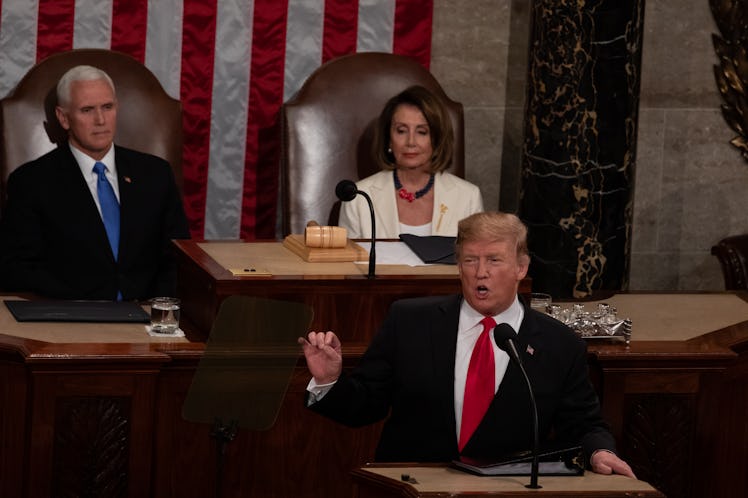
Here's What Trump Can & Can't Do About Declaring War
Just when you all thought 2020 was coming in quietly, President Donald Trump pulled a move that has casual observers to (reportedly) his own military advisers reeling. On Jan. 2, Trump ordered a military strike on Iranian General Qassem Soleimani, killing him and prompting the beginning of an international conflict. Now, many Americans are speculating the escalating conflict may become an armed conflict. But, does the president have the power to actually declare war? Just like pretty much everything about this situation, it's a little complicated.
On Thursday, Jan. 2, the Pentagon reported that Soleimani, a prominent and controversial figure who was a leader in fighting ISIS but also accused of terrorism by the United States, had been killed in an American air strike at the international airport in Baghdad, Iraq. The move shocked many observers of international affairs for its escalation of diplomatic conflict with Iran, with which the United States has a fraught relationship. In a Jan. 3 statement, the Pentagon said that Soleimani had been planning imminent attacks against Americans, which prompted the attack. However, many saw the move as foolish at best, and possibly even an illegal action of war by the president. In remarks on Jan. 3, Trump said that the move was intended to stop a war, not start one.
Technically, the president does not have the power to officially declare war. The Constitution actually gives the power to declare war to Congress under Article 1, Section 8 — not the president. However the president, as commander in chief, has the power to direct military action, including, generally, actions that fall short of war. In recent decades, the line between the two has blurred. As Cornell Law School's Legal Information Institute points out, a lot of the major conflicts of recent decades — including the multi-year Vietnam War — started without congressional approval. In 1973, pretty much for that reason, Congress passed the War Powers Resolution, which requires a president to notify Congress within 48 hours of troops being committed to a conflict, and to remove them within 60 days unless an extension is approved by Congress. In practice, however, it has been seen as largely ineffective.
Further complicating things is another piece of legislation giving military authority to the president. In September 2001, Congress passed the Authorization for Use of Military Force against Terrorists (AUMF), which authorized the president to "use all necessary and appropriate force" against any people, nations, or organizations involved in the terrorist attacks on 9/11. The Trump administration has previously hinted at using AUMF as justification for an attack on Iran, and in a series of tweets on Jan. 3, Vice President Mike Pence claimed that Soleimani had personally been connected to the 9/11 attacks. Per The New York Times, there is no evidence to support this claim.
Despite the administration's attempts to justify the move, lawmakers condemned Trump's use of military force, saying it would lead the United States into an international conflict it didn't want. On Jan. 5, Reps. Ilhan Omar of Minnesota and Barbara Lee of California announced a resolution to invoke the War Powers Act to remove troops from the region. The resolution would tie military action against Iran to a vote in Congress. "Let’s not mince words: the assassination of Qasem Soleimani was an act of war undertaken without Congressional authorization, in violation of the Constitution of the United States of America," Omar said in a press release. The resolution accompanies a similar one introduced in the Senate by Sen. Tim Kaine of Virginia. The White House did not immediately respond to Elite Daily's request for comment on the resolutions.